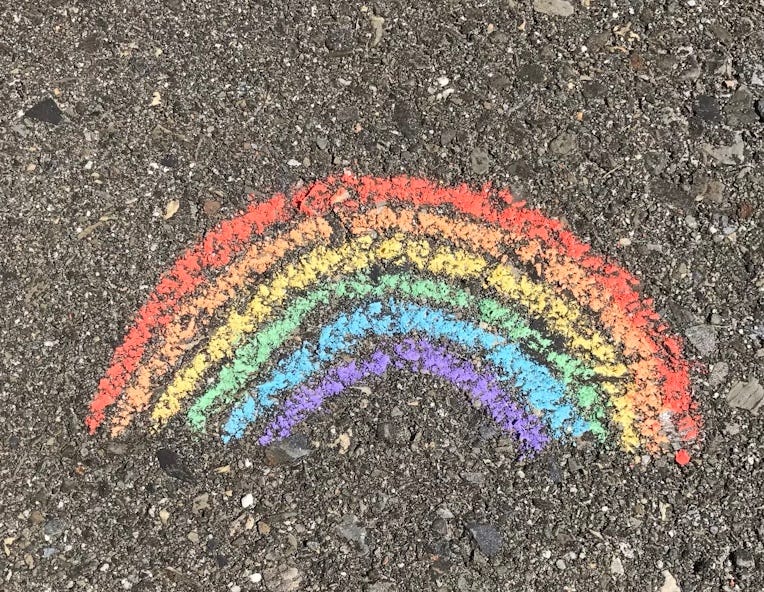Pride Month Is Over, Now What?
Why LGBTQ+ support can’t just be seasonal. (Written for Psychology Today)
Photo by Alex Jackman / Unsplash
As soon as June 1st arrives, Pride flags go up everywhere. Company logos and merchandise get a quick rainbow makeover. Social media explodes with #loveislove and #PrideMonth.
You’d think that as a member of the LGBTQ+ community, Pride Month would make me feel proud. And it does to some extent. But mostly it reminds me that we aren’t doing enough the other 11 months of the year.
Now that Pride Month is over, what do you notice? The flags come down. The rainbow merchandise is donated to Goodwill. The company logos go back to their original colors. And many members of the LGBTQ+ community are left wondering if the support was real or just performative.
Before we talk about what true allyship looks like, let’s get a few things straight (no pun intended):
There’s nothing wrong with hanging up a rainbow flag.
There’s nothing wrong with changing your logo or posting #loveislove.
But if your pride disappears the moment July comes around, that flag means nothing. A rainbow doesn’t make you an ally. Consistency does.
Why is this so important? Because the stakes are high.
In 2024, 39 percent of LGBTQ+ young people seriously considered ending their lives, with more than 10 percent making an active suicide attempt. This isn’t just a statistic. We are seeing warning signs that cannot be ignored.
Somewhere right now, there’s a teenager who believes they will never fully be seen. There’s a college student who would rather die than have his parents find out he’s gay. There’s someone scrolling through rainbow posts in June, finally feeling seen, but knowing that they’ll be forgotten in July.
If we aren’t visibly showing support all year, how are young people supposed to know that being gay or trans or nonbinary isn’t a bad thing? That being “accepted” is the bare minimum, not the goal? That queer people deserve to feel loved, safe, proud and celebrated every day?
This is why Pride Month isn’t enough.
It’s like icing on top of a cake.
All the parades and celebrations and rainbow flags—that’s the icing. It’s colorful and tasty and fun. Everyone wants some. But what is icing without a cake underneath? It’s just sugar on a plate. It may look sweet, but it’s got no substance.
The cake is what matters. It’s the daily support, the year-round allyship, the way you show up for members of the LGBTQ+ community when it’s not on trend or easy.
If a company donates 1 percent of profits to LGBTQ+ causes in June but doesn’t do anything to support their LGBTQ+ employees the rest of the year, that’s icing with no cake.
If a parent posts #TransRightsAreHumanRights in June but continuously misgenders their kid the rest of the time, that’s icing with no cake.
It’s performative allyship. It’s theater.
Spreading the icing is the fun part. Baking the cake is harder.
True allyship means you’ve put in the time and effort to make the cake from scratch. And when you’re a true ally and you also celebrate Pride Month, that’s icing on top of an already beautiful and delicious cake. And that’s a dessert I can get behind.
So what’s involved in baking that cake?
Talking about LGBTQ+ identities before someone comes out: Don’t wait for your kid or your friend to bring it up. It’s your job to normalize talking about gender identities and sexuality now.
Interrupting harmful language and behavior, even when it feels awkward: If your child or anyone else says something homophobic or transphobic, don’t laugh it off or change the subject. Ask them what they mean and explain why their words matter.
Being cognizant of your language: Notice when you assume someone’s gender or use heteronormative language. Practice inclusive language, even though it may feel unnatural.
Doing your own research: The burden of teaching you how to use inclusive language or how to be a better ally should not fall on your token member of the LGBTQ+ community.
Matching your words with your actions: Telling your kid, “You can tell me anything,” is meaningless if you interrupt or dismiss them when they take you up on that.
Owning your mistakes: You are going to mess up and say the wrong thing. Don’t make a big deal out of it. Apologize (if it’s appropriate), learn from it, and move on.
Showing true support doesn’t always involve grand gestures or public displays. It’s what you do when no one is watching and when there’s no credit to be taken.
Pride isn’t a once-a-year opportunity to show how progressive you are. It’s not a corporate strategy or a box to check. It’s a reminder that people are watching, especially young people, to see if your support is genuine or just seasonal.
References
The Trevor Project. 2024 U.S. National Survey on the Mental Health of LGBTQ+ Young People. https://www.thetrevorproject.org/survey-2024/




